Sheridan Alford is one of the organizers behind the online movement, Black Birders Week. Throughout Alford’s life, there were key experiences that were vital to fostering the dedication she currently has for wildlife and the outdoors. This love for nature was cultivated by her mother – a middle school teacher who was adamant about outdoor appreciation. It was on hikes and family trips to natural history museums that Alford’s admiration for wildlife was nurtured. “Those years served as a guide and helped me hone in on a focus which easily propelled me to take the necessary classes, meet enriching volunteers, and partake in quality research that would later shape my course towards the career goals I have today,” Alford described.
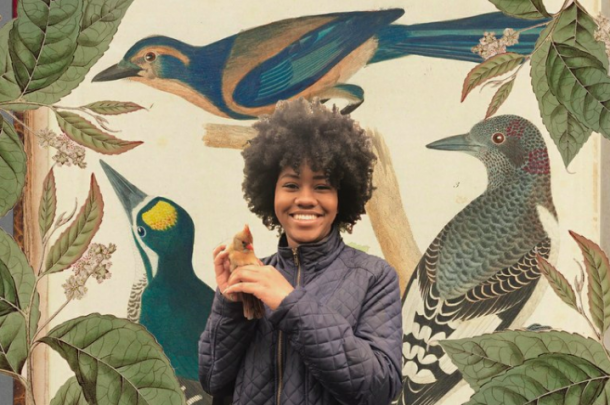
Sheridan Alford holding a female northern cardinal during a bird banding lab at The University of Georgia. Credit: Lora Haas
Alford’s field experiences have taken her across the American South, and her current research topic includes an assessment of “African-American interest in bird watching as an outdoor recreational activity.” Alford is currently completing her Master of Science degree in Parks, Recreation and Leisure Studies at The University of Georgia, with a special focus on environmental outreach and education. During our interview, which has been edited and condensed, Alford touched on her passion for wildlife and the great outdoors, the formation of Black AF in STEM, and the increased diversity she would like to see within environmental and outdoor spaces.
Q: How long have you been birding? What attracted you to the recreational activity in the first place?
Sheridan Alford (SA): I’ve been birding for about two years now, officially. That’s you know, going out on walks with binoculars and everything, the whole shebang. I can definitely pinpoint my love of birds too. That was in high school when I was in Language Arts class. One of my teachers had an activity where we had to describe an object to someone as if they had never seen it or encountered it. One of the challenges was to describe a bird. I love how birds all have little quirks about them, crows are extremely smart, northern mockingbirds are known to be extra feisty individuals, hummingbirds are so delicate and yet very territorial. All of these characteristics are what make you laugh when you observe the birds at feeders or in their natural habitat. It adds a sense of understanding when you’re first learning about the different species. I think at that point I realized just how unique and fascinating birds are. My passion for birds just spiraled from there. Also, when I was an undergrad at University of Georgia, taking ornithology classes, all of my classes were directed at nature in some form or fashion. Going on field trips to South Georgia and being involved in some lab research where we did bird banding, gave me a full scope of what you can do to study birds and how you can observe them.
Q: After years of careful study, do you have a favorite bird?
SA: There’s so many great birds, but my favorite is probably the northern cardinal. I know some people think it’s just a backyard bird, but for me they are really like the home team classic. I’m from Georgia, I’ve lived here all my life, and I think the northern cardinal was probably the first bird I could identify as a child and I knew exactly what type of bird it was. I always say that cardinals are my home team bird because they truly do not migrate. As I got older, I really realized how magic they are. I personally like to watch the mating pairs a lot. It’s one of the few birds where their mates are always close by or within eyesight. You can watch the pairs follow each other around in the backyard and if you see one you can almost guarantee that their mate will be close by. I’ve also been able to hold a couple of cardinals. Their personalities are super spicy and I love it. The males of course go with University of Georgia colors, red and black, all day, every day! They have many qualities that I identify with. They are feisty and they are known for their tenacity. Even if people consider them as sort of a “basic” bird that is more common, and maybe sometimes fade into the background, they still have spunk, and qualities that should be noticed. I’m also a hopeless romantic and I love that northern cardinals are a monogamous bird pairing! I really identify with that.
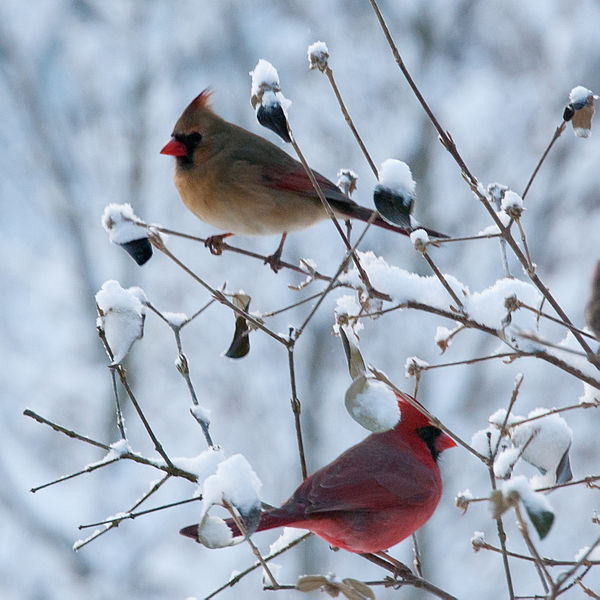
Till death do us part: northern cardinals mate for life. Credit: Nosha/Wikimedia
Q: How did you form the organizing team for Black AF in STEM? Who makes up the team?
SA: The organizing team for Black AF in STEM is very large. Jason Ward, who is a birder in Atlanta, put together this group chat. Over time each of us started to add our own people. The name of the group chat has the same name as the initiative, Black AF in STEM.
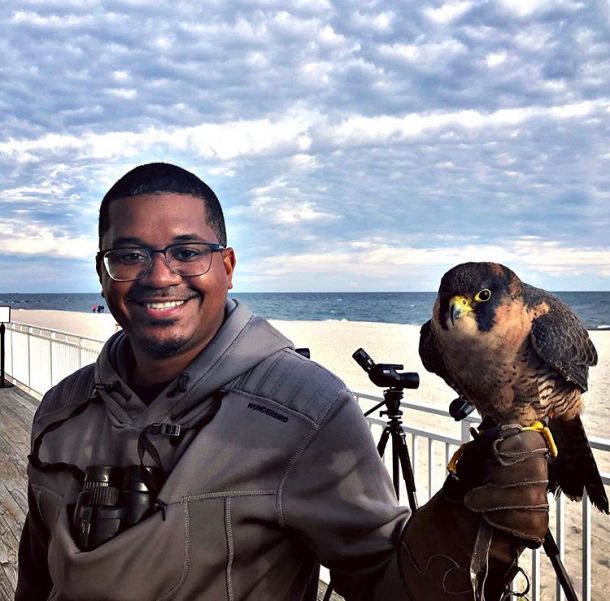
Jason Ward, host of “Birds of North America” holding a falcon. Credit: Topic Studios
SA: In terms of Black Birders Week, that was a more focused group of us who were working to get it off the ground. We proposed the idea in the group chat and then it just took off. We created the social media pages and just started prepping for it. In terms of organizers for the actual week, there are six of us. Anna Opoku-Agyeman, it was her pitch. She is actually an economist, not a birder, but we’re trying to get her there! We are a group of young STEM professionals which includes science, technology, engineering, and math. Danielle Belleny studies the northern bobwhite quail, I’m doing environmental education, Chelsea Connor studies herpetology, Tykee James works for the National Audubon Society in DC, and lastly, the founder, Joseph Saunders, studies herpetology. It’s a collective effort and I think it’s important that all of us are mentioned. We recognized the need for it and we came together. At first there were only 30 of us who were part of the Black AF in STEM group chat. Now it’s just grown, as people have added their friends. I think there’s almost a hundred people that are a part of it now. Some of the members are in the field right now, but they go to the group chat when they have service. Everybody’s super spread out. I’ve probably only met three people in person from within the group, which is insane and just goes to show the power behind technology.
Q: What has the response been to the very first Black Birders Week?
SA: Initially we knew Black Birders Week was a good idea, but we did not expect the huge response that it really received. We love it. We welcome a lot of people, especially during this climate we’re currently in. Black people are angry, heartbroken, and often traumatized by the riots taking place and we greatly appreciate being able to provide smiles and positivity into these dark times. We welcome everyone who wants to help support Black Birders Week and the awareness we are trying to spread. I love seeing all the allies and their posts, people are really excited about Black Birders Week that are not Black, and are not birders, that might be one of the greatest things about it. Even though the week was created for birders who are Black, we encourage anyone and everyone to support the group.
I think my favorite comments and interactions have come from the first day, which was #BlackInNature. I’m really big on branching through generations and a girl posted a video of just her and her grandpa sitting in nature together, and he was pointing out the robins, that really touched my heart. You also have people posting pictures of their kids and they were going camping, it is just great to know that there are other Black people out there with that same passion for nature, spreading it, and sharing it so people feel welcome. Representation is everything. I think a lot of times it gets overlooked or gets put on the back burner. Just seeing someone that you can somehow identify with makes a world of difference.
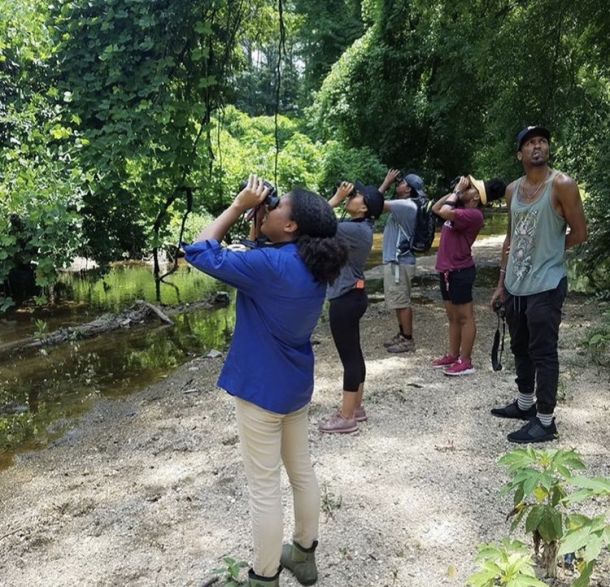
A group of Black birders participating in a bird walk in Atlanta, GA. Credit: Tamara Johnson
Q: When you watched the interchange between Christian Cooper and Amy Cooper in Central Park, what went through your mind?
SA: Whenever I see a video similar to that, where you have a situation where there’s a person of color or a Black person filming like that, they are filming for their own safety. My reaction is always empathy for that person and how they are feeling in that moment. Sometimes you can hear people’s voice shaking and you just know that they are terrified. Even if they are trying to stay strong in this situation, I think I am always just worried for them. When I was watching the video I thought of my family. Christian Cooper is a seasoned veteran in the birding world. He knew how to handle it, but what if that was my younger brother in that situation? He probably would not have known how to handle it as well. I think it’s common for us to imagine a lot of these videos we see of racism happening to our family members because we all understand it could very well happen to one of them. No one is excluded from acts of racism, as Christian Cooper’s situation showed. Whether you are birding, from Harvard, jogging just like Ahmaud Arbery, we are all targets and that is something that everyone in the group could identify with.
Q: Have you or your team ever experienced this kind of treatment when conducting fieldwork or enjoying the outdoors?
SA: Even before the Central Park incident, when the jogging video came out of Ahmaud Arbery, our group started having conversations about how we carry ourselves, little things that we have to think about as opposed to our white colleagues when we go out in the field. From a birder standpoint, I always try to make sure all my gear is visible. I make sure people can clearly see that I have binoculars, or they can clearly see that I have some kind of bird shirt on or something, an identifier. It’s more of an added annoyance. It’s annoying that I have to take extra precautions outside of what’s required to do what I love. And then you remember that other people don’t have to think about these same tasks and it adds to the frustration. The overarching sadness of “why can’t I just do what I love and it’s not harming anyone. And why do they feel threatened by just a person, who is Black, and birding?” I think these are often the thoughts of many Black people that I’ve spoken with, the “why is my existence a hassle?”
When I used to intern for U.S. Fish and Wildlife Service, I worked on a bat survey. I worked on these surveys with my boss, who was also a black woman and wildlife biologist. When you conduct a bat survey it’s something that you have to do during the night. We also had to drive around in rural Georgia on backroads at 12 miles per hour. We made sure to have all the proper paperwork and identification we needed. So the majority of the night went well, and then we were at the very tail end of our route, and we got stopped by this cop. He said that he pulled us over because we were driving so slowly, but we were hoping to avoid that because we were in an SUV that says U.S. Fish and Wildlife Service all over it. We explained the situation, and the scenario went well considering, but it was still a scenario that we had to deal with. So that really drove the point home. The fact that, as a Black person you just hope it goes well and all your credentials check out and nothing bad happens with the police. However, as the media has proven it’s really with anyone. A friend, a Black male, was in a residential suburb doing his job and looking for a poisonous snake that had been reported. A woman was apparently frightened by his presence even after he explained himself, as we had done. She went inside and later her husband came out with the dog. All went well when speaking with the husband, but again, another situation where you go in not knowing what to expect and you just hope today is not the day that you’re unlucky.
Q: In my research I found that Black Americans make up less than two percent of all visitors to National forests, wildlife refuges and parks, while white visitors comprise 95 percent of all visitors, according to the US Forest Service, National Park Service and Fish and Wildlife Service. Can you tell me more about what Black AF in STEM is doing to make the outdoor industry and environmental space more diverse?
SA: Our most immediate action and goal of this week is to create the dialogue within industries. A lot of people have expressed that they didn’t notice the STEM fields weren’t diverse. It’s part of our goal to bring this fact to the forefront. Right now as we get our organization off the ground we are encouraging supporters and donors to direct their efforts towards Black owned organizations and non-profits that are doing great work in providing access to Black children and adults and teaching them about the outdoors. In the future we would like to have enough funding to host a conference of sorts to invite Black people in STEM to come teach and learn new skills related to their fields. I would love to teach a kids segment on identifying backyard birds and how to use binoculars! We as a group have found our calling but it’s nothing if we don’t spread the wealth.
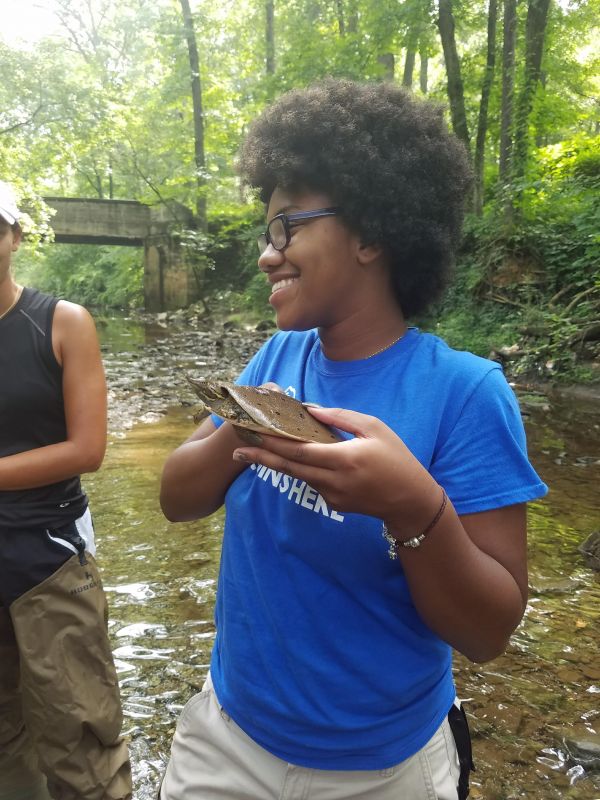
During a U.S. Fish and Wildlife Service research study in Atlanta, GA, Sheridan Alford and her volunteers found an American softshell turtle.
Q: How would you like to use your environmental outreach skills to further the movement?
SA: I’m in grad school here in Athens, Georgia and before COVID-19 happened I was going to the Boys and Girls Club every week. When I would go, we would specifically do nature related activities to expose kids to the wonder of the natural world. I was working with mostly kids in the fifth grade and we had a lot of fun. I think it is very important at a young age, but also in high school when kids are really trying to decide what they want to do career-wise. It’s important to give them role models who look like them, to show that there are possibilities. I want them to know that it’s within reach and not just something that they might see on Animal Planet.
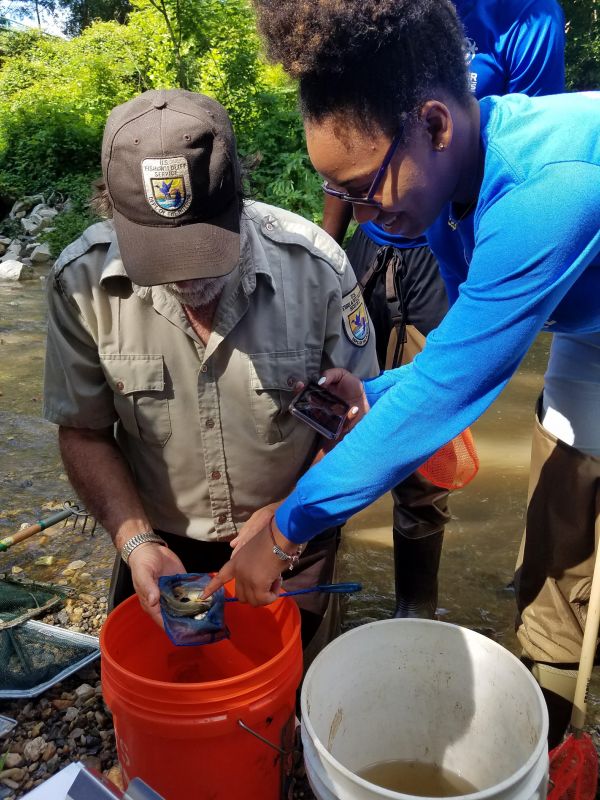
Students identifying physical characteristics of fish species in Proctor Creek, Atlanta, GA. Credit: Sheridan Alford
SA: I think one of my greatest strengths is I love to plan an event, and it’s something that I’m good at as far as administration goes. I think my dream job would be to become an environmental outreach coordinator. Someone who thinks of ways to invite and encourage people to participate in nature and with wildlife. I think that would be something that I would excel at, but it would also bring me a lot of joy to share my passion for nature with others. I definitely think that a couple of us would be interested in doing that environmental education. Getting back into schools. I feel like schools used to do a lot of outdoor things and go on school trips. I can definitely remember a couple childhood memories of going to farms and things like that. Nowadays I don’t really see many schools or programs going out of their way to get kids into nature. I had to go out of my way and propose the program to the Girls and Boys Club.
Q: How can we keep the momentum going after Black Birders Week is over?
SA: Our goals for the initiative are first and foremost visibility and representation, but also uplifting and recognizing Black birders. Due to the changing cultural climate of diversity in nature and physical sciences, just showing that the birding community is accessible to all is probably our first goal. We also want to create a dialogue about the value of diversity within the birding community as a whole. We are trying to work on a lot of initiatives as far as providing resources for black naturalists and black people in STEM, as well as creating safe spaces.
The majority of us are in academia currently, if not recently graduated. All of us can agree that scholarships need to be available and, or increased, specifically for black people in STEM or black people in nature. There aren’t that many scholarships to begin with and they are not targeted at all towards disenfranchised groups. So if we could start a creative fund that individuals, companies, brands can donate to, or create a few scholarships for different STEM fields, that would be amazing. We want to promote that next generation, we’re all good at it and everything, but our kids are going to be off the charts, so we have to set them up for success. We are talking about maybe doing some sort of conference where people who are part of the community can get skills training, and learn about different professions and good things that can continue to uplift the Black community. Funding is important for all the things that I mentioned. A lot of us are putting in a lot of man hours at this point. It’s a whole second job. We have been trying to work with organizations and even outdoor brands. It’s very important to continue this momentum of Black Birders Week. A lot of outdoor brands provide services or products that a lot of Black people don’t have access to. Birding scopes can sometimes be thousands of dollars. It would be great if brands could donate products for tours and workshops.
Q: What is a question you have not been asked in an interview, but you would love to answer about the work you are doing?
SA: One thing that nobody has asked me personally about is the mental health impact of the initiative. This is something that I think about a lot. Our initiative is hopefully bringing light and hope during this darker time. The only thing that has kept me above water this past week has been Black Birders Week. Being able to see everyone’s smiling faces, doing what they love, being unapologetically Black has held me up. That and the people I created it with. We are hopefully bringing light to people. It’s a really trying time for Black people right now. Not only myself, but the whole organization just wanted to bring positivity to people’s timelines, something that people would be happy to engage in on social media, especially when social media is not the happiest place to be right now.
